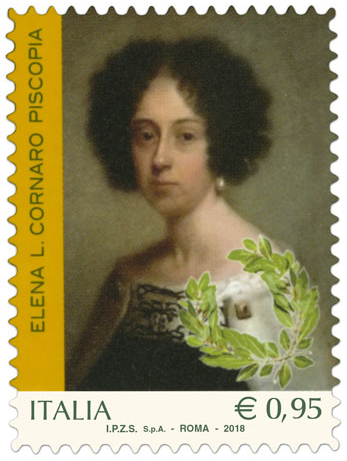In November 2017, a delegation of scholars from Oxford, including the Chichele professor of medieval history Julia Smith, the Cultures of Knowledge project director and professor of early modern intellectual history Howard Hotson, and the professor of modern history Robert Gildea, visited the University of Padua to discuss potential collaboration between the two institutions. One outcome of this visit was the establishment of a framework to enable student exchange, and duly an undergraduate from the Galileian School and the University of Padua was selected to visit Oxford in Trinity term 2018. With the support and encouragement of Professor Paola Molino at the University of Padua, this first student, Francesco Zambonin, elected to spend his month in Oxford learning about epistolary metadata with Early Modern Letters Online.

(Source of image: Posteitaliane)
In addition to acquiring valuable experience in the necessary preparation of metadata prior to upload into an epistolary union catalogue, Francesco chose to compile an inventory of correspondence for one of the most fascinating Italian female scholars in the early modern period. We are delighted to be publishing in EMLO this week the fruits of his work with the release of the catalogue of the letters of Elena Lucrezia Cornaro Piscopia.
Cornaro Piscopia (1646–1684) was born illegitimate, the third child of a Venetian patrician (and subsequent procurator of St Mark’s) Giovanni Battista Cornaro and his then mistress Zanetta Boni; although the couple married in 1654, only their sons were legitimized. Cornaro Piscopia’s gift for languages (which earned her the title ‘Oraculum Septilingue‘), music, and mathematics, in addition to her erudition in theology and philosophy, were encouraged from an early age and permitted to flourish.[1. See Edward Aloysius Pace, ‘Elena Lucrezia Piscopia Cornaro’, Catholic Encyclopedia (1913), vol. 4.] This female scholar chose not to marry — rather, she entered the Benedictine order as an oblate — and her scholarship became renowned across Europe. At the age of just nineteen, she was referenced in the dedication to her father by the Swiss theologian Johann Heinrich Hottinger in the sixth volume of his Historia Ecclesiastica, and she is recorded as having been elected as member to seven academies in five different Italian cities between 1669 and 1672.[2. See Johann Heinrich Hottinger, Historia Ecclesiastica Novi Testamenti … Seculi XVI. Pars II. (1665); and Patrizia Bettella, ‘Women and the Academies in Seventeenth-Century Italy: Elena Lucrezia Cornaro Piscopia’s Role in Literary Academies’, Italian Culture, 36, 2 (2018), p. 100.] In 1678, Cornaro Piscopia was awarded her doctorate in philosophy at the University of Padua and in the process — as far as has been established to date — she may have become the first woman to attain this degree. Certainly, the process attracted widespread attention: her viva was conducted in front of crowds too numerous to be accommodated in the university hall and thus the ceremony was moved to the Basilica of Saint Anthony of Padua, where Cornaro Piscopia chose to discourse on Aristotle, whose work she had studied under the guidance of the philosopher Carlo Rinaldini (1615–1698).
Upon her death from some form of wasting illness in 1684 , Cornaro Piscopia was buried in Santa Giustina, Padua. The following year a medal was struck by the university in her honour and in 1688 a collection of her writings was published.[3. Benedetto Bacchini, Helenae Lucretiae (Quae & Scolasticae) Corneliae Piscopiae … Opera quae quidem haberi potuerunt (Parma: Ippolito Rosati, 1688).] This same year, in a letter to his friend Samuel Pepys, John Evelyn wrote of: ‘Helen Cornaro, daughter of a procurator of St. Marco (one of the most illustrious families of Venice), who received the degree of Doctoress at Padua for her universal knowledge and erudition, upon the importunity of that famous University prevailing on her modesty. She had been often sought in honourable marriage by many great persons, but, preferring the Muses before all other considerations, she preserved herself a virgin, and being not long since deceased, had her obsequies celebrated at Rome by a solemn procession, and elogy of all the witness of that renowned city.'[4. Diary and correspondence of John Evelyn, ed. William Bray (1857), vol. 3, p. 296.] Notwithstanding Corrnaro Piscopia’s wish to be interred simply and not in a tomb more fitting with the status of her father’s family, the scholar’s remains were disinterred in 1895 by the English Benedictine Abbess Mathilda Pynsent and placed in a new casket, and a new tablet was erected to her memory. It seems fitting today that the pioneering student to visit Oxford from Padua within the parameters of a new exchange scheme should honour the memory of Elena Lucrezia Cornaro Piscopia in EMLO with the beginnings of an inventory of her surviving correspondence.
